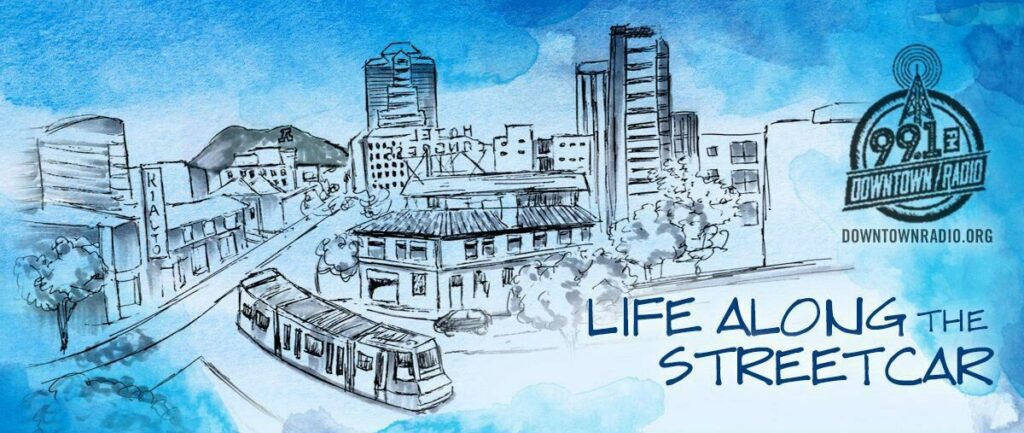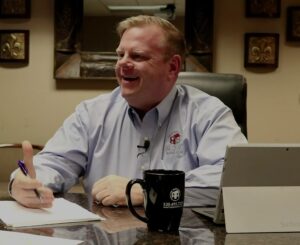Mark Stegeman is serving his third term on the Governing Board for the Tucson Unified School District, he is an Economics Professor at the Uofa and host of the weekly radio show Education Matters on 99.1FM Downtown Radio.
Today we’re discussing the state of education in the urban core and if our community is positioned to welcome new families to the downtown area. We see a tremendous amount of economic development and we tout the area as a place to live, work and play…but is it also a place to learn.
Back to School Special
This week we talk urban education with Mark Stegeman, a TUSD Board Member and host of “Education Matters” right here on Downtown Radio
Each and every Sunday our focus is on Social, Cultural and Economic impacts in Tucson’s Urban Core and we shed light on hidden gems everyone should know about. From A Mountain to the U of A and all stops in between. You get the inside track- right here on 99.1 FM, streaming on DowntownRadio.org- we’re also available on your iPhone or Android using our very own Downtown Radio app.
Reach us by email contact@lifealongthestreetcar.org — interact with us on Facebook @Life Along the Streetcar and follow us on Twitter @StreetcarLife—
Our intro music is by Ryanhood and we exit with XXX
Today is July 28th, my name is Tom Heath and you’re listening to “Life Along the Streetcar”. We start today with News of sorts about old resorts
Transcript
Education Matters in the Urban Core
Tom Heath: Well, we have a very special guest in the studio today. Normally I follow this gentleman and I’m in the studio and preparing my show and I get to hear his guests at his takes on the state of education as it relates to TUSD Tucson Unified School District and has got a lot of insight a lot of topics and occurred to me the other day. We’re discussing a lot about Downtown Development. We have businesses moving in people relocating lots of housing under way.
We have a motto of live work and play in Tucson’s Urban core, but we don’t have learned in there. So we thought you know what let’s find out the state of public education as it relates to the urban core and we’re course. We’re defining that from a mountain to the U of A as the footprint of our show and see what plans are in the future.
So my guest today is Mark Stegman. He’s the host of Education matters the show that Write in to us every Sunday. He’s on tsd’s governing board of directors. He’s an economics professor at the U of A and every now and then he has a few minutes and we like to take advantage of that. So welcome to the show mark. Thank you.
Mark : It’s nice to be on a different mic.
Tom Heath: It’s a one jump from the hosts are two guest chair. Appreciate you doing that for us. So how how long have you been involved with the TUSD governing board?
Mark : I have been there about ten and a half years.
Tom Heath: All right. So what what more specifically what does though governing board? What’s the responsibilities summarizing about 30 seconds
Mark : by Statute the governing board basically runs everything it is legislative executive and judicial for running school districts in Arizona governing boards under statute have tremendous authority over how to run their districs
Tom Heath: And the the schools that are involved. These are what we would consider public schools to Charter Schools and other schools come into under your direction.
Mark : No, Arizona is the most aggressive in its Charter School legislation. And so whereas in some schools like California Charter Schools come under the Aegis of their local districts to some extent here charter schools are completely independent.
Tom Heath: Okay, so we’ll have I think there’s some as we talk about the urban area. There’s a little bit of mix between the different types of of some religious base schools charter schools public schools to will make sure differentiate those and talk specifically about TUSD.
Mark : Absolutely.
Tom Heath: Now, how does one get on the board?
Mark : one gets on the board by being elected and I’ve been elected three times once and then re-elected twice by comfortable margins, but I have to say when I look back at my campaign platforms. A lot of it hasn’t happened some has but a lot of it hasn’t
Tom Heath: But we will we’ll talk about some more some future things here. Hopefully, we’ll make some things happen that we can come and come through today on the board. Is there any criteria to serve or is it just a matter of running and being elected?
Mark : You have to be 18 years old and live in to TUSD after lived in to TUSD for a year.
Tom Heath: So you don’t need to have kids in the school system. You don’t have an education background.
Mark : No, you don’t even have to have an education.
Tom Heath: Okay surf board of education as long as the public once you’re there you’re there.
Mark : Well, that’s right. I mean with it’s basically saying we trust the public to make choices,
Tom Heath: we won’t get into the politics of there’s been a lot of news and I think every other week there’s some Story coming out of TUSD. I don’t want to get into the politics of that if people are interested they should tune into your show education matters at 11:00, but it seems like there’s a lot of turmoil on occasion. So but I would like to know why would someone want to serve on the governing board?
Mark : Oh well when I got on it. It’s was mainly because I think education is tremendously important. That’s a cliche but it’s absolutely true and the u.s. Education system K12 is struggling.
We have a great University system. So we’re world leader in University education with K12 is struggling and is I think behind many countries have lower income and so TUSD seemed like an opportunity to do something about that locally and I think in that respect I represent broadly speaking a lot of people do University who see the same problems with kids coming into the university without Having learned what they need to know.
Tom Heath: So you’re saying the the effects of the product that TUSD and other school districts are putting out in your you think they’re we can provide a better product for our University system.
Mark : For our universities and for our Workforce and for our country, I was on the general education Committee of the university the university wide committee for years and we dealt with in general education freshmen and sophomores coming in woefully underprepared many cases.
Tom Heath: Do you have you seen a change in? I don’t know if it’s attitude or policy now that we’ve seen a larger push for epic Economic Development and we know that companies that choose to relocate here. Look at our educational based you have you seen a change in in the board’s direction or an implementation?
Mark : One of the arguments for a charter school system is it it will force the competition Charters forces the traditional districts to up their game, you know, the power of competition. I think there has been some effect Statewide. I am not sure that his work very well with TUSD frankly.
Tom Heath: And and with TSD is JTED. Is that part of TUSD or is that a separate District
Mark : No, that’s a separate countywide District created by the voters than those vocational education. I think jted is really a great thing in this community a very well-run institution
Tom Heath: and I should note also that you occasionally about once a month dedicated to show towards jted. So that’s another thing if you’re interested in learning more about that and the efforts they’re doing with all kinds of Education from high school all the way through Community College and you of a onto the workforce.
I think it’s great work that they’re doing but we we brought you on to talk. Out downtown and again kind of a broad definition of that really from a mountain to the U of A. This is sort of current Urban core that we have what kind of presents do we currently have from TUSD or are we are we started we have enough schools for currently. What’s what the population is
Mark : TUSD has 86 schools and they white vary widely in quality. I’m happy to be able to say that some of the stronger schools TUSD stronger schools are in the downtown region. Davis Elementary is very well-regarded. Creo is one of the best schools in the district. THe CREO principle is one of thos these two principles that the county superintendent has picked out as a principal trainer for everyone in the county.
Man’s, one of our strongest middle schools is mansfeld, which is not exactly downtown but close to downtown. So we TUSD does relatively well in that region and are some other strong schools to I don’t mind saying, City high is a downtown is a strong contributor long time charter school. And so I think education downtown is actually in better shape than in some parts of the city.
Tom Heath: Are there is there enough capacity for like if you live near Carrillo school or your your your children able to get into Carrillo schoolers as their restrictions other their wait list.
Mark : Neighborhood schools, neighborhood so every well not every school most of the schools have neighborhood boundaries. And if you live in that neighborhood, you are entitled to go to the school. It’s Carillo was generally totally subscribed. So the the neighborhood enrollment plus C and open enrollment, which is people wanting to come from outside is more than a school can handle
Mark : That’s true for Davis. So yes, generally the neighborhood kids can’t get in but everyone else Cannot necessarily get in.
Tom Heath: So, we’re at a point where all the neighborhood we have open enrollment. Meaning that there is capacity currently for everyone living in those neighborhoods.
Mark : Yes, everyone who lives in a neighborhoods is more or less entitled to get in.
Tom Heath: Okay. Now I’d heard and maybe this is a different structure but is is Miles Elementary is that part of TUSD?
Mark : Yes miles is part of TUSD and miles is also has a very good historical reputation.
Tom Heath: Okay, because I’d heard that someone in the neighborhood had mentioned to me that they weren’t able to get in because it was structured may be structured differently or perhaps they…
Mark : Miles is subject to some different rules. Okay, and and so it depends on the like like, you know, Dodge is another example of a school that has had doesn’t have a boundary and so it’s open enrollment throughout the city and not everyone who wants to Get Inked and get in but miles is a good example of another school into TUSD and it’s general neighborhood that has historically a very good reputation.
Tom Heath: Yeah, the The conversation was that they were they lived within walking distance, but they were concerned that they wouldn’t be able to get in because of the popularity and how strong that school was though and that I just wanted to bring that up. It’s interesting to know it’s structured differently because of the type of curriculum?
Mark : Well, Miles has always had well, I don’t know I don’t always but it has long had an emphasis on kids with hearing disabilities. Okay, and so a high fraction of the kids there have that kind of disability and it’s been great for those kids and one reason that parents from outside from far away don’t live close to Miles go to miles is that they’ll get some American Sign Language and we’ll get some exposure to those kids with that that issue and that’s I think one of the really cool things about Miles.
Tom Heath: Okay, that makes more sense that that would be more an open enrollment to make sure you’re serving the needs of the community in general. We talk about Economic Development a lot on this show and the things that were excited to see when there’s this balance of old and new coming in and the some of the concerns about the housing that’s going up and some of the opportunities that are coming to downtown as it seems to be geared towards more young professionals not necessarily families and as I’ve talked to individuals I’ve heard well part of it is that there really isn’t this confidence that we have the capacity to educate them that they would have to be leaving the the urban area anyway to go to school.
So they’re trying to live closer to some of their schools maybe in and some of the other townships around here. Is there does TUSD have a like a threshold like when a community has a certain number do we have to start looking at adding schools or is that done through vote?
Mark : We have talked for a long time not so much the downtown region specifically but we’ve been talking for a long time about having to build capacity in the southwest side the two high schools. Although we have tremendous excess capacity and I see Districtwide the to South West Side High School’s.
Cholla and Pueblo are always close to full, sometimes more than full that is where the development is going on in Tucson. At least from TUSD’s Viewpoint. I mean up in Marana Oro Valley those aren’t into TUSD, but from tsts Viewpoint, that’s where the growth is occurring.
That’s where the growth will continue to occur, our schools there and there’s elementary schools to like White and others a lot of those are very full. And yes where there’s no particular rule about when you have to start looking at it maybe creating a new school, but that’s definitely a potential issue for us.
Tom Heath: Okay. So what is that something that if if this is a concern, how do you bring this up to you? Do you go to a governing board meeting and get on the public record or or or how do you how do you apply there?
Mark : We have we have an audience call it lots of times. That’s the most interesting part of the meeting and you can get on the record we have at the last meeting. We approved a desegregation impact analysis for reopening Wakefield. So Wakefield middle school is one of the ten, nine or ten that we closed in the last round in 2013. And I’ve always thought that it would be a good candidate for your opening and that’s a way that we could increase capacity without having to build new school.
Tom Heath: Now that leads there’s actually a lead in to our next Point here. But before we do that if you just joined us my guest today is Mark Stegeman. He’s a member of the TUSD governing board. He’s been on there for this is in his third term there. He’s also a professor at the University of Arizona teaching in the economics department.
So he sees students coming through there at different levels of preparation and we know him best because he’s host of Education matters, which is a show here on Downtown Radio every Sunday at 11:00 and Mark you just talked about some of the closures from 2013 that was economically driven.
Primarily we’re seeing a change in in the in the economics of Tucson to some degree and the concern that I’m hearing from from individuals is that we have these businesses in a large businesses may be relocating to Tucson or downtown Tucson, but they’re living in Vail, Oro Valley, or Marana and commuting in so the the tax dollars the the property tax dollars are going to those districts and not coming into into Tucson. Is that a concern for TUSD?
Mark : Oh absolutely of all the large school districts in this state, TUSD has seen by far the steepest enrollment declines over the last 10-15 years with the entry of charter schools. And so yes, it’s a concern that the developments occurring outside of TUSD, a lot of it. As you said said in Vail, Miranda, Oro Valley and I think part of that not all of it, but I think part of it honestly is because people perceive those school districts as being stronger than TUSD.
So I think we’ve a little bit created our own problem, but it is a problem because every year if you lose enrollment you lose millions of dollars of state aid, and that just makes the problem of expanding capacity that harder the TUSD has a great imbalance. We have tremendous excess capacity now on the east side the eastern half the district and we have not accessed in some cases shortage on the west side and down which includes downtown what you’re talking about.
Mark : And but of course, you can’t just move schools. And so at the same time that we’re having to think about expanding capacity on the southwest side or the west side. We are losing money because of a Norman losses on the east side. It’s a difficult problem.
Tom Heath: I’m wondering it when when businesses are just probably outside of your specific area, maybe a question more for like Sun Corridor or some of those Rio Nuevo those organizations helping to bring businesses. They look at things like crime statistics in school records and I’m wondering if they’re seeing a blanket of TUSD and not recognizing that maybe in some areas where they may want to relocate there is a stronger presence. You you spoke very highly of the schools in the downtown area. Are those Broken Out In Their Way for people to evaluate?
Mark : Well, I think I think that’s a problem. I think TUSD has a somewhat damaged brand but the individual schools vary widely and there are some very strong schools in TUSD, depending and probably what you’re looking for. And I think that they get dragged down a little bit by the brand although as I mentioned some schools like like Davis and Carillo are full and we need to think about what we can do to expand capacity if we can afford to do so.
We need to expand it in the right way the last school new school that we opened was which was on the west side was the McCorkle school and it struggled, it’s doing a little better now, but it’s struggled and because it’s not enough care had gone into the planning for how would open successfully and recruit the highest quality staff. And so it’s not just a question of building stuff building buildings or even reopening closed schools.
Mark : You have to do it in the right way that you’ll be offering a quality product that people want
Tom Heath: It’s certainly not a fix that’s going to happen at any one particular level with any particular group of people certainly going to be a community effort. We need more funding for our teachers in general and that that’s not restricted to TUSD.
Mark : Absolutely. Absolutely and you know many their problems education funding in Arizona. There are problems with the charter system that has been in adequately regulated in the past. Well that’s improving a little bit there are lots of problems, but that doesn’t mean you know as TUSD or any other District we can just blame everyone else for our problems and there has been little bit of a tendency and TUSD to use these external things which, though real, can be exaggerated to use those external things as an excuse and and in many, you know respects we need to do better at many schools, but not Carillo, you know, I which is absolutely a great School.
Tom Heath: Mark where are we going to wrap up here? But before we go, is there anything we didn’t talk about today that you think we should be covering and relationship to TUSD with economic development. Urban schools capacity.
Mark : Well, I think that part of the capacity issues will be addressed by some Charter Schools. Honestly are planning to open on the southwest side the charter schools that have not had a presence there. So it doesn’t strictly depend on TUSD, but I think there needs to be an internal discussion about what we’re going to do about the Eastside – Westside imbalance and and own up to that and talk about probably you know, the biggest thing is only the open a new high school somewhere in the southwest side at some point in high schools are expensive and I it makes sense to have a conversation with the city about that. But TUSD has to get its own thinking straightened out. I think first, you know, and then and then talk to the other entities.
Tom Heath: Mark, thank you very much. Mark Stegman. He’s host of Education matters on Downtown Radio, you can listen to his show every Sunday at 11:00. He’s our governing board member for TUSD and he’s a professor of Economics at the University of Arizona, Mark, thanks for coming on today.
Mark : My pleasure. Thanks for the chance.
Tom Heath: And this is Life Along The Streetcar. My name is Tom Heath you listening to Downtown Radio 99.1 FM and available for streaming on Downtown Radio.org




